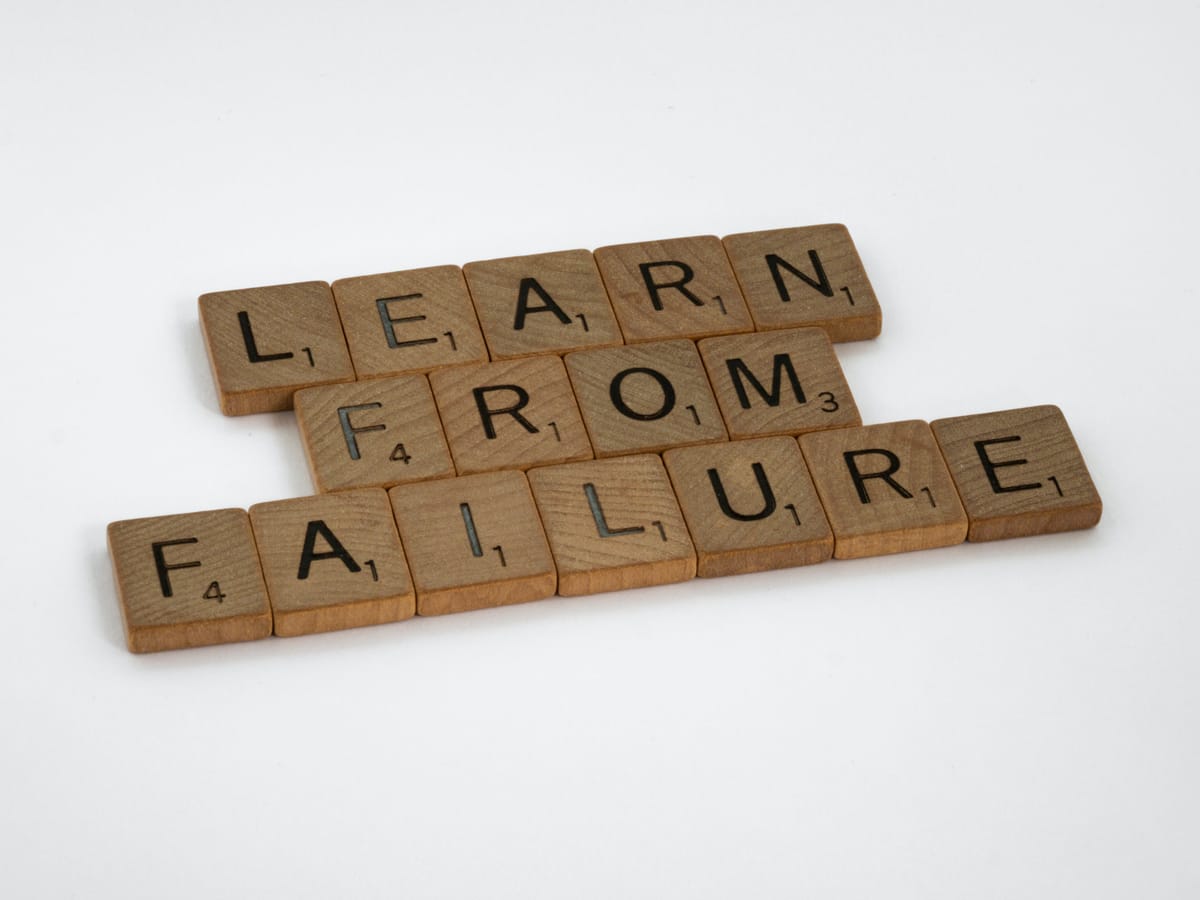FAILURE is much better than SUCCESS
Success is a mirage, behind it there is only ego and conformity

In the 20th century, when the ideas of purity and perfection were at their peak, failure was extremely frowned upon because people associated it with imperfection, and defective products should be discarded. Instead, our grandparents admired the successful man, flawless in whatever they do in life, with money, health, and sex appeal. This was the model to follow but this was mostly out of reach for most people, which derived into a futile frustration among the population as they appeared to be not good enough - worthless individuals in a society that demands greatness. However, the ideal was unrealistic and even the people who seemed to achieve it were not at 100% compliance with this model of greatness. Instead what they did superbly was save their appearances. They could 'buy' evidence of skills and achievements. Need to show you are smarter than other people? Do not worry, if you donate a building to X university (like Harvard, ehem), you can get in without satisfying the entry requirements. There are many news articles about nepotism and biased admisissions at Harvard online. Need to show your kindness? Fund a charity with the spare millions of pounds in your pockets. Instagram, or any other type of social media, was not the catalyst for the growing number of people boasting about the pretty side of their life to others while hiding all the manure under the carpet, this behaviour existed way before its invention. Everyone has their defects because certain external factors influence our life such as genetics or tragic accidents. When people realised that by sharing a misleadingly ‘perfect’ lifestyle they were advocating a practically unachievable model, they decided to change the status quo to a friendlier one which is the one we have currently. Now, failing is fine, the world is cruel and just trying your best is good enough. Everyone should applaud you for your efforts and the ones that criticise the causes of your failure are savages that do not how to behave in this society.
The reaction against failure can be proactive, by identifying the causes of the failure and taking action subsequently, or not proactive by simple negligence through excuses and procrastination.
Success at an early stage is not always a good sign. It could mean that the activity engaged in is easy, not requiring high expertise or a lot of effort, so it is not valuable because anyone else could do it. A clear example of this is video games, one of their main appealing traits is the ease to gain recognition and instant gratification of doing something well. Thus emitting a torrent of endorphins that hijack our brain. The fact that it is so easy to feel successful while playing video games can increase the risk of neglecting reality in favour of the virtual world because true success requires time and work. Additionally, there is no guarantee of success in the real world, video games are designed to make the player the protagonist of the story.instilling the feeling of uniqueness and geniality in them, whereas in the real world they are mostly average because they are basically wasting their time in something unreal. This mechanism of video games to create people addicted to non-real but gratifying success is unfortunately widespread in our society, it can be seen in football spectatorship or social media. These effortless activities give us a dose of dopamine that is enough to feel good, but not enough to satisfy us totally, so we always go back to the source of the problem believing it is the solution. Therefore, early success might be a synonym of the instant gratification trap. However, what if the activity is actually something difficult and valuable? Then, the more plausible explanation for the initial success would be a natural talent, which is, in my opinion, a double-edged sword. Of course, natural talent increases the learning progression and the success rate, but it could paradoxically do the contrary. When talented people find out they are continually succeeding, two tendencies are usually developed. First, the assumption of being the most skilled person in that activity as this is constantly supported by the results. This can derive into a false sensation of immobilism, that this winning stage will elongate over time and there is no need for the person to work hard in order to keep up with the learning progression, making people lazier and conformist because they feel there are no others better than them. Second, the neglect of reality is closely related to the idea of the last sentence. Regardless of the natural talent, when people are starting something, they would rarely compete against the best people already in that activity, instead they compete against other novices. Therefore, the relative competition is beneficial for the talented person, not the absolute competition. Now, because the talented person is in a conservative attitude in terms of results obtained, and they want to keep succeeding, this will cause a risk-averse mentality that will prevent the talented person from competing with people better than them – as they may potentially lose, thus falling into stagnation just as the trap of instant gratification; pursuing the pleasure of winning and not of improving.
There are two main reasons to justify why people are reluctant to fail. The fear of rejection is well instilled in our genes, people tend to believe that failing will cause the society to contempt them as inferior beings, that they will lose the respect of their fellows, even though this is not true. We do not wish to show our defeats because it seems that we are weak. Therefore, engaging in low-risk or socially acceptable activities has become the norm in most populations nowadays. Another reason is that failing requires a minimum amount of effort to exit the comfort zone and engage in something new and challenging. In a world that advocates for the state of maximum comfort, there is a lot of friction to do something out of our comfort zone.
The reaction against failure can be proactive, by identifying the causes of the failure and taking action subsequently, or not proactive by simple negligence through excuses and procrastination. The problem with the first option is that it requires acceptance of the crude reality of hard work and patience; whereas the second one is fast, cheap, and comfortable. People are lazy by nature, so guess which one they tend to choose.
How does one combat the fear of failure? One word: acceptance. You need to accept two facts: you will die, and there is always a bigger fish. On the one hand, life is very short and you should not live according to the expectations of others because we do not live in the Stone Age, so the rejection of the group is not deadly anymore. Additionally, note that after death, you will not care anymore about mortgages, careers, etc. On the other hand, regardless of how hard-working and talented you are, you will not be the best in all the situations, even if you just specialise in a specific field. However, this should not be alarming as we live in a world with more opportunities than ever in human history thanks to the rise of living standards and globalisation. As well as the competition is becoming international, the opportunities are too. Besides, the success of others can be used as a source of inspiration; and note that successful people might be potential high-quality partners. In a paradoxical world where mediocrity and competition are coexisting in harmony, be like the blacksmith, most of the hammer blows will not be perfect but the difference is that each blow is modified according to the outcome of the previous one, polishing impurities. Finally, due to perseverance and using feedback correctly, a fine sword is forged to slash the armour of ego and conformity we are all trapped in, me included.










